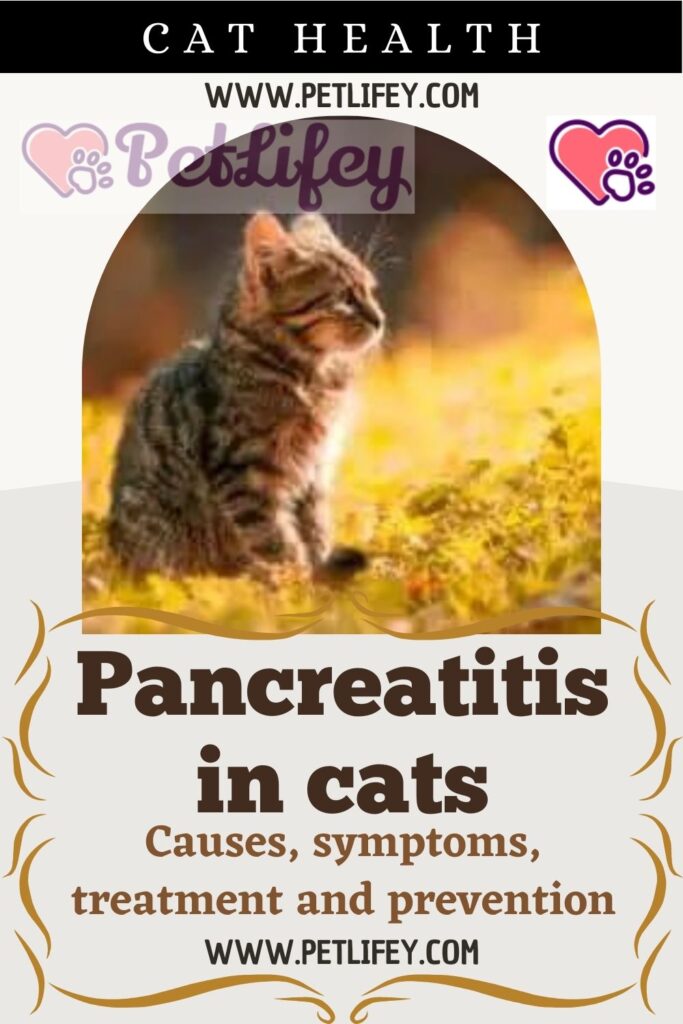
Diagnosing pancreatitis in cats is more complicated as the symptoms in cats are much less conventional and specific than those seen in dogs, thus making diagnosis more difficult. Let’s find out the causes, symptoms and treatment of pancreatitis in cats.
As the name suggests, pancreatitis is a condition that affects an organ called the pancreas, a small organ located behind the stomach and stuck in the small intestine. Its role is to ensure the production of enzymes to promote digestion and the production of insulin, a hormone essential for the proper functioning of the body and whose disruption is the basis of diabetes disorders.
Causes of cat pancreatitis
The causes of pancreatitis in cats are varied. Several factors are to blame:
- trauma (shock on the belly)
- viruses (herpesvirus, calicivirus, feline infectious peritonitis (FIP) …)
- toxoplasmosis in cats
- bacteria that flow through the ducts to the liver or intestines
- tumor in cats
Sometimes no cause is found (idiopathic pancreatitis), even six obese cats appear to be predisposed to this inflammation.
It is thought that the inflammation may be related to bacteria from the gut or from the liver or an ischemia (decreased arterial blood flow) would be the cause of the activation of digestive enzymes within the pancreas, causing the disease.
Acute and Chronic Feline Pancreatitis Symptoms
There are two types of pancreatitis, the acute form which occurs suddenly with violent symptoms and the chronic form, with more common symptoms that evolve slowly over time. The chronic form is therefore more difficult to diagnose because the clinical signs are less marked. In both cases, the symptoms are different and not very specific because they are common to other diseases:
- vomiting and cat diarrhea
- decrease or loss of appetite
- extreme fatigue, apathy
- hyperthermia (fever)
- increased thirst
- abdominal pain
- liver disorders (jaundice …)
- kidney failure in cats
- vascular disorders
- peritonitis, ulcers
Diagnosis
Diagnosis of cat pancreatitis involves a clinical examination and various complementary tests. Then your vet can proceed to:
- A blood test that includes a test for liver enzymes, blood sugar, white blood cells, and an ionogram (measurement of ions including calcium, phosphorus, and potassium)
- The dosage of FPL (feline pancreatic lipase) in the blood, a pancreatic hormone
- An ultrasound to visualize inflammation of the pancreas, and possibly that of surrounding organs such as the liver
- A biopsy
Diagnosis of pancreatitis in cats is not always easy and the prognosis varies based on organ involvement. A cat exhibiting vomiting should be promptly referred to a veterinarian for early treatment and the best possible recovery.
Treatment of cat pancreatitis
The cat will first be rehydrated with washing and the vomiting will be controlled by injected drugs. It is very important to manage the pain that is not always easy to highlight in the cat. Morphine or one of its derivatives can be used. Finally, depending on the cause, antibiotics or anti-inflammatories will be given.
Since cats in this phase are generally inappetent, feeding will be done through probes. There are two ways to feed the cat: the nasophageal tube (the tube passes through the nose into the esophagus and stomach) or the esophageal tube (the tube is implanted into the esophagus through a hole in the neck).
These probes are generally well tolerated by the animal and may sometimes require continued treatment at home. In some special cases, surgery may be indicated. For example in case of cat abscess or bile duct obstruction.
Pancreatitis in cats can be avoided

Since, as we have already explained above, the exact causes of pancreatitis in cats are not determined, it is difficult to propose adequate preventive measures against this condition. The risk of onset can be reduced by limiting the factors listed above as much as possible. A balanced diet for the cat adapted to the lifestyle of the animal and an ordinary vaccination and parasiticide protection will help to protect it.
Furthermore, cats that live exclusively indoors appear to be more affected by this disease, possibly due to a lack of physical activity and immune stimulation. Taking vitamin and mineral supplements will help boost his immune system, but try to get him moving if you can.
Finally, make sure your cat is drinking and not getting dehydrated and take him to the vet at least once a year for a full health check (at least twice a year if he is elderly). As for acute pancreatitis, consult your vet quickly and do not hesitate to anticipate the vet’s diagnosis by asking for more in-depth examinations.






